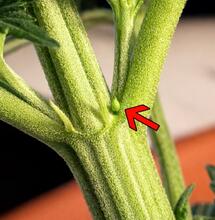Cannabis Promotes a Healthy Appetite

A strong and proper appetite is essential to good health; Cannabis can help to regulate and stimulate our desire to eat. This article discusses the importance of nutrition, the lack of appetite as a result of illness, and how cannabis can ‘hijack’ the brain to actually make people feel hungry and urge them to eat.
Research has shown that marijuana can basically hijack your brain and send you in a state of ‘munchies.’ It does so by causing critical neural structures to switch from signaling not hungry to feeling hungry.
Healthy people do not need to think about when to eat - it is something that is instinctual. In fact, in most developed countries, there is a problem with an excessive appetite. Stats show that a significant portion of people in Western countries are overweight. They are surrounded with a plethora of food and many have little in the way of self-control. Often, people lack the knowledge of what foods they should consume to promote the health of their individual body. The types of meals available may emphasize flavor, rather than nutritional profile. Eating is as simple as spending a small sum for an abundance of sweet calories. Sweet and salty flavors, alone or in combination, have been clinically shown to be as addictive as hard drugs such as heroin.
Poor Appetite as a Result of Illness
Often, patients suffer from a disease that creates a poor appetite. When surrounded by food, the affected person has no desire to eat. These patients have been shown to have a neurological imbalance. The presence of a healthy appetite is itself an exhibition of a healthy nervous system. A poor appetite makes it difficult for the body to heal when the nutrients needed for repair are lacking.
The medical term for lack of appetite is cachexia, also referred to as wasting syndrome. Patients with cachexia have trouble eating and maintaining energy levels. When a patient presents with cachexia, a doctor will generally consider the possibility of cancer, metabolic acidosis (from decreased protein synthesis and increased protein catabolism), certain infectious diseases (e.g., tuberculosis, AIDS) and some autoimmune disorders. Patients with anorexia also exhibit a lack of appetite symptom.
The exact mechanism by which these diseases cause cachexia is not fully understood, but it largely owes to altered metabolism, increased protein breakdown and decreased protein synthesis. Inflammatory cytokines (cell types that promote inflammation), such as tumor necrosis factor-alpha (colloquially ‘cachexin’ or ‘cachectin’), interferon gamma and interlekuin 6 (IL-6), as well as the tumor-secreted proteolysis-inducing factor (PIF) may all play a role.
Various drugs have been investigated to treat cachexia, including corticosteroids and megestrol acetate for appetite stimulation. Cannabis in the form of Dronabinol is also dispensed to patients to promote healthy appetite and weight gain. None of these medications is perfect, therefore investigational drugs are also used and tried in different patients, depending on the case.
Cachexia physically weakness patients to a state of immobility, which stems from loss of appetite, asthenia (physical weakness) and anemia (disorder of the blood). Where treatment response is poor, cachexia decreases the prognosis for these patients because, without adequate nutritional building blocks, their bodies cannot repair themselves.

Carbohydrates, Lipids and Protein for Overall Health
Carbohydrates are used by the body for energy and movement, whereas lipids for fatty acids are required for neurological function because they are a component of nerve cell membranes. Lipids are also necessary for hormone synthesis. Protein is the nutrient that is often neglected and misused, despite being the most important for body maintenance. The average person requires 0.75 grams of protein for every kilogram of body weight. Protein is important for tissue repair, muscle development and carrier molecules in the blood.
The Cannabis-Cancer Connection
Between fifty and eighty percent of cancer patients suffer from cachexia, according to the National Cancer Institute. Cachexia is fairly common among terminal cancer patients. In addition to increasing morbidity and mortality, aggravating the side effects of chemotherapy and reducing quality of life, cachexia is considered the immediate cause of death for approximately twenty to thirty percent of cancer patients. Symptoms of cancer cachexia include progressive weight loss and depletion of adipose tissue (where lipids/energy stores in the body) as well as depletion of skeletal muscle.
Treatment approaches to reverse metabolic abnormalities seen in cancer cachexia may include a combination of pharmacological interventions, special diet, and integrative therapies (e.g., acupuncture, massage, reiki), alongside conventional cancer treatments which could involve chemotherapy and surgery. But not always do these treatments deliver satisfactory results.
Cannabis has long been known to be an appetite stimulant. The phenomenon of ‘the munchies’ has been written about and seen in movies and on television. As knowledge of the human brain’s cannabinoid receptor system increases, scientists are gaining a better understanding of why Cannabis users cannot seem to stop eating.

What’s the Neurobiology of Cannabis ‘Munchies’?
The hypothalamus part of the brain may hide the secrets of why people feel the bottomless hunger after exposure to cannabis. Cannabis does target a specific set of cells in this part of the brain, neural structures that normally make the body feel full. It eventually switches them to signal hunger, altering their chemical release and facilitating the urge to eat. This has been observed in more than one study, in both human and animal studies.
Recent research in rodents showed that the cannabinoid-1 receptor, a direct cannabis target, controls the activity of Agouti Related protein neurons. That is an important group of “feeding” cells in the hypothalamus, which promotes hunger when under the influence of marijuana.
Earlier research further implies that munchies may owe to brain cells that normally make the body feel full by releasing the alpha-Melanocyte-Stimulating Hormone, or α-MSH. These neurons are actually mediators of the Cannabis-induced munchies, not just there to promote satiety, according to researchers with the Yale School of Medicine.
The neurons probably switch the chemicals that they release. Cannabis seems to spark the release of opioids called beta-endorphin by the POMC (pro-opiomelanocortin) neurons - also in the hypothalamus. The beta-endorphins appear to act upon receptors that promote eating behavior, essentially changing the function of the neuron cells.
All of these cannabis-triggered chemical reactions in the brain happen while the body won’t change its overall activity levels. Meaning the need for food will increase without physical exercise.
In addition, cannabis consumption has been linked with a slight delay in gastric emptying in humans. Which, according to more research, may also contribute to increased appetite.
These finds of course have huge implications for medical use of cannabis, particularly for those needing appetite stimulation, such as cancer-fighting patients. Food is the best medicine for the body, but sometimes for the body to be able to uptake food it does need other medicines, which can be Cannabis.
More from Soft Secrets:












